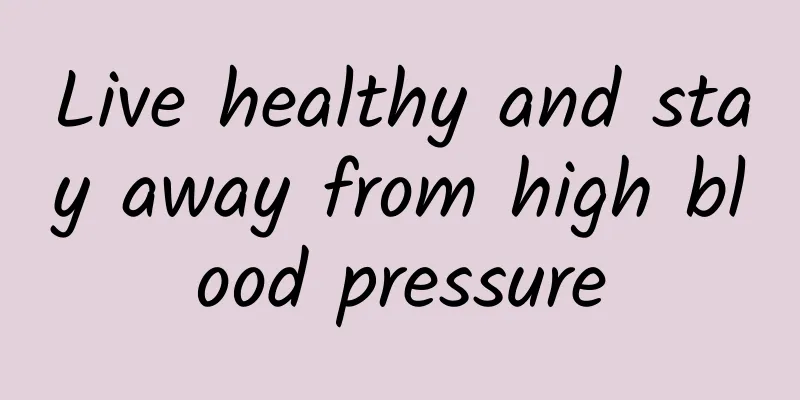Live healthy and stay away from high blood pressure

|
Hypertension is a common chronic disease, also known as primary hypertension or simple hypertension. It usually refers to the pressure of blood in blood vessels exceeding the normal range. Hypertension can be divided into primary hypertension and secondary hypertension, of which primary hypertension is the most common one. This article will introduce the causes, symptoms, prevention and treatment of hypertension in detail. 1. Causes of Hypertension Hypertension can be divided into primary hypertension and secondary hypertension, which usually have the following causes: Causes of essential hypertension: (1) Weight: Weight is an important factor affecting blood pressure levels. The heavier the weight, the higher the blood pressure level. This may be related to the impact of weight on the heart and blood vessels. (2) Dietary factors: Excessive intake of salt, excessive drinking, and excessive intake of saturated fatty acids can all lead to high blood pressure. A high-salt diet promotes the secretion of angiotensin, which causes high blood pressure; excessive drinking can also have adverse effects on the heart and blood vessels; excessive intake of saturated fatty acids can increase the cholesterol content in the blood, thus affecting cardiovascular health. (3) Psychological factors: Excessive psychological stress such as long-term tension, anxiety, fatigue, etc. can lead to high blood pressure. This may be related to the impact of psychological stress on the neuroendocrine system. (4) Genetic factors: People with a family history of hypertension are more likely to suffer from hypertension. This may be related to the influence of genetic genes on blood pressure. 2. Causes of secondary hypertension: (1) Kidney disease: Kidney disease is one of the most common causes of secondary hypertension. Diseases such as renal vascular stenosis and renal parenchymal damage can lead to high blood pressure. This may be related to the impact of impaired kidney function on the neuroendocrine system. (2) Endocrine diseases: Endocrine diseases such as pheochromocytoma and primary aldosteronism can cause high blood pressure. These diseases affect the normal function of the neuroendocrine system, thereby causing high blood pressure. 2. Symptoms of Hypertension Symptoms of high blood pressure vary from person to person, but they usually include: Headache, dizziness, tinnitus, blurred vision and other neurological symptoms. These symptoms may be one of the most common manifestations of hypertension, but they may also be ignored by patients. Headache is one of the most common neurological symptoms of hypertension, usually manifested as throbbing pain or dull pain. Dizziness is also one of the common neurological symptoms of hypertension, which may be related to insufficient blood supply to the brain. Tinnitus and blurred vision may be related to vascular lesions caused by hypertension. Cardiovascular system symptoms such as palpitations, chest tightness, and shortness of breath. These symptoms may be caused by increased cardiac burden or myocardial ischemia. Palpitations refer to the feeling of irregular or rapid heartbeats; chest tightness refers to the feeling of chest pressure or discomfort; shortness of breath refers to the feeling of rapid or difficult breathing. These symptoms may be related to cardiovascular system lesions caused by high blood pressure. Other symptoms include fatigue, weakness, and difficulty concentrating. These symptoms may be caused by physical discomfort or psychological stress caused by high blood pressure. Fatigue and weakness may be related to metabolic disorders caused by high blood pressure; difficulty concentrating may be related to neurological symptoms caused by high blood pressure. 3. Prevention and treatment of hypertension Prevention and treatment of hypertension should start from the following aspects: Control your weight and maintain an appropriate weight range. Obesity is one of the important risk factors for high blood pressure, and losing weight can help lower blood pressure levels. Eat a healthy diet, reduce salt intake, limit alcohol intake, and reduce saturated fatty acid intake. Excessive salt and saturated fatty acids in the diet may cause high blood pressure, and drinking alcohol may also increase the risk of high blood pressure. Therefore, it is recommended to reduce salt intake and alcohol intake and choose a healthy diet. Exercise moderately and maintain an appropriate amount of physical exercise. Moderate aerobic exercise can help lower blood pressure levels and improve cardiovascular health. It is recommended to perform at least 150 minutes of moderate-intensity aerobic exercise per week. Psychological adjustment, reduce psychological pressure, and maintain a good attitude. Excessive psychological pressure such as long-term tension, anxiety, fatigue, etc. can lead to high blood pressure. It is recommended to use relaxation techniques, deep breathing and other methods to reduce psychological pressure. Check your blood pressure regularly to detect abnormal blood pressure in time. Checking your blood pressure regularly helps you detect abnormal blood pressure in time and take appropriate measures. It is recommended to check your blood pressure at least once a year. Follow the doctor's advice, take medicine on time, and control blood pressure within the normal range. For patients who have been diagnosed with hypertension, they should take medicine on time under the guidance of a doctor to control blood pressure within the normal range. At the same time, they should pay attention to the side effects and contraindications of the medicine. |
Recommend
Only 11 years old! Fujian boy diagnosed with fatty liver, his mother regrets: He eats every day... Parents should stop spoiling him
In the pediatric clinic of the Provincial Hospita...
What are the symptoms of blood heat and uterine cold?
Most women have a cold constitution, which can be...
Enter the world of "bipolar disorder" and heal your "mental cold"
Enter the world of "bipolar disorder" a...
As flu season arrives, here’s what parents need to know…
Flu, learn about it! Influenza (flu for short) is...
Conservative treatment of ectopic pregnancy with traditional Chinese medicine
We all know that the most obvious sign of a woman...
During special periods, it improves metabolism, helps with nutrient absorption and toxin discharge
Metabolism, in simple terms, is the process of co...
Half a month after the flow, there was suddenly brown
There is still brown secretion more than ten days...
A pustule on the female vulva
Women should pay attention to the cleaning of the...
Where is the most sensitive part of a woman?
We know that girls are very sensitive, and differ...
26 weeks pregnant, stomach pain
After becoming pregnant, pregnant women must pay ...
Successful milk recovery after one month of weaning
For many women, the process of weaning is relativ...
BCG: Why can’t the “first shot” given at birth stop the “shotgun” of adult tuberculosis?
Dear friends, imagine this: You spend a lot of mo...
A picture of a woman's vaginal discharge
Nowadays, the influence of women in daily life co...









